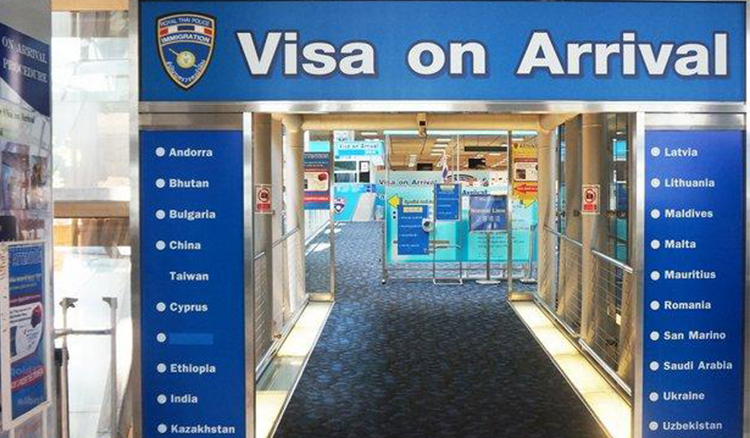
TOURISM
Some tourist fees waived
The government plans to exempt visitors from visa-on-arrival fees during November and December as it strives to salvage falling tourist numbers.
The initiative floated by Deputy Prime Minister Somkid Jatusripitak aims to reassure Chinese tourists, whose numbers have declined since the Phuket boat tragedy in July.
Yuthasak Supasorn, goveror of the Tourism Authority of Thailand, said Mr. Somkid has authorised the Immigration Office to exempt 21 nations from visa-on-arrival fees in the final two months of the year.
The exemption is expected to help foreign arrivals edge towards 40 million, up from the target of 38 million. Chinese arrivals could reach 12 million, compared with the earlier target of 10.5 million.
The government is also mulling a waiver f the 2,000-baht visa fee for Chinese visitors to increase their numbers.
Private tourism operators are worried that Thailand may lose up to 1 million Chinese arrivals over the next six months if the country is unable to restore confidence in safety issues.
The decline of the Chinese market will have an immediate impact on the country’s tourism, which contributes 20% to GDP.
From the over 35 million foreign visitors last year, roughly one-third of arrivals were Chinese. But their visits have notably decreased after the Phuket boat accident.
The decline is set to hit tourism and related business, particularly travel agencies, hotels, restaurants and souvenir shops, experts in the industry said.
Vichit Prakobkosol, president of the Association of Thai Travel Agents (ATTA), said travel operators and airlines from the mainland are still not putting Thailand in their packages from October until March 2019.
The rules for Visa On Arrival are printed on the Immigration Bureau’s website.
The six-month period is a seasonal high season for Thailand. Local tourism operators have enjoyed the peak season for many years as foreigners come for leisure and vacation.
Operators and the Chinese government are concerned about safety and security measures after a tour boat capsized off Phuket in July, killing 47 Chinese tourists.
“I believe we risk losing 1 million arrivals from China for the high season, which could equal a loss of 50 billion Baht,” Mr. Vichit said.
Hotel bookings plunge
“Chinese guests at hotels in major destinations such as Bangkok, Pattaya and Chiang Mai have already plunged by 20-30% since the boat tragedy, in addition to the continued weak Yuan currency,” said Supawan Tanomkieatipume, president of the Thai Hotels Association (THA).
Hotels in big cities, mostly three- and four-star level, have shifted to focus on the China market over the past several years. Chinese customers represent 10-50% of total customers.
A source at a four-star hotel in the Sukhumvit area said customers from China have dropped by more than 50%, especially during the Golden the Week earlier this month.
“THA members reported not many advance reservations from China for this month and the rest of the year,” Mrs. Supawan said. “This is proof that we are at high risk.”
If the situation is not improved, tourism in the first three months next year will continue to face difficulty, she said.
Since the boat disaster, both ATTA and the THA have revised down projections for the China market, expecting total Chinese arrivals to miss the 10 million targeted for this year.
Mrs. Supawan said hotels and tourism businesses in Chiang Mai could see a lighter impact, as many tourists from southern China travel on their own, not as part of a group tour.
The THA said dwindling Chinese tourism will hit local businesses in many secondary provinces and communities.
In order to reclaim Chinese guests, ATTA and THA have urged the government to improve safety and security measures.
“The one issue that Chinese want to hear from our government is to ensure better safety,” Mr. Vichit said. “If we are unable to assure them on this, they will not come.”
Chinese tourists have reportedly turned away from Thailand and shifted to Japan, South Korea, Vietnam, Malaysia and Singapore.
Pongpanu Svetarundra, permanent secretary of tourism and sports, said the number of foreign tourists to Thailand stood at 2.65 million in September alone, up 2.3% from the same period last year.
Of the number, 648,000 were Chinese, down 14.9% year-on-year, with tourism income falling 11.5% to 36.87 billion baht.
Most visitors in the month came from East Asia, Europe, South Asia, the Americas, the Middle East, Oceania and Africa, in that order.
During the first nine months of 2018, Thailand received 28.5 million international tourists representing 8.7% year-on-year growth.
Tourists have generated income of 1.4 trillion baht, up 10.9% year-on-year.



